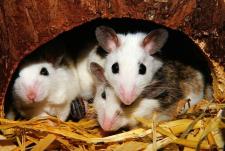Mouse eggs made from skin cells in a dish
By David Cyranoski,
Nature
| 10. 17. 2016
In a tour de force of reproductive biology, scientists in Japan have transformed mouse skin cells into eggs in a dish, and used those eggs to birth fertile pups. The report marks the first creation of eggs entirely outside a mouse. If the process could be made to work for humans, researchers could produce artificial eggs without needing to implant immature cells into ovaries to complete their development.
Katsuhiko Hayashi, a reproductive biologist at Kyushu University in Fukuoka, led the group that announced the breakthrough on 17 October in Nature. In 2012, when at the University of Kyoto, he and stem-cell biologist Mitinori Saitou reported taking skin cells down the pathway towards eggs: reprogramming them to embryonic-like stem cells and then into primordial germ cells (PGCs). These early cells emerge as an embryo develops, and later give rise to sperm or eggs. But to get the PGCs to form mature eggs, the researchers had to transfer them into the ovaries of living mice.
The next advance came in July 2016, when a team led by Yayoi Obata, at...
Related Articles
By Jonathan Matthews, GMWatch | 12.11.2025
In our first article in this series, we investigated the dark PR tactics that have accompanied Colossal Bioscience’s de-extinction disinformation campaign, in which transgenic cloned grey wolves have been showcased to the world as resurrected dire wolves – a...
By Jessica Hamzelou, MIT Technology Review | 11.07.2025
This week, we heard that Tom Brady had his dog cloned. The former quarterback revealed that his Junie is actually a clone of Lua, a pit bull mix that died in 2023.
Brady’s announcement follows those of celebrities like Paris...
By Lauran Neergaard, AP News | 11.03.2025
WASHINGTON (AP) — The first clinical trial is getting underway to see if transplanting pig kidneys into people might really save lives.
United Therapeutics, a producer of gene-edited pig kidneys, announced Monday that the study’s initial transplant was performed successfully...
By Meagan Parrish, PharmaVoice | 10.10.2025
When CEO Ben Lamm steps into the spotlight, it’s usually to talk about his efforts bringing extinct animals back to life. Once a far-flung idea, Lamm and the company he heads, Colossal Biosciences, have proven they can pull it off...




